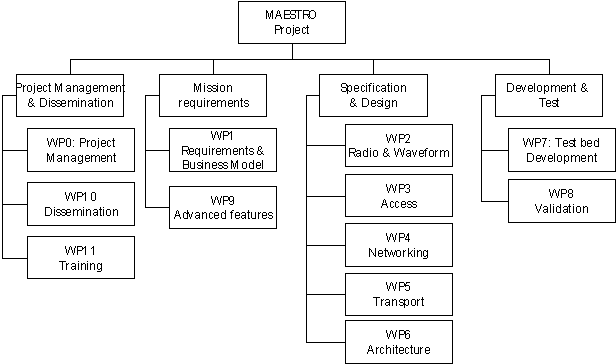MAESTRO project
abstract
Summary
The Mobile Applications & sErvices based on Satellite
& Terrestrial inteRwOrking project (MAESTRO) aims at studying technical
implementations of innovative mobile satellite systems concepts targeting close
integration & interworking with 3G and Beyond 3G mobile terrestrial networks.
MAESTRO aims at specifying & validating the most critical
services, features, and functions of satellite system architectures, achieving
the highest possible degree of integration with terrestrial infrastructures.
It aims not only at assessing the satellite systems’ technical and economical
feasibility, but also at highlighting their competitive assets on the way they
complement terrestrial solutions.
To complete these objectives, MAESTRO will value and extend
large parts of the IST/FP5 MoDiS and SATIN contracts results and outcomes, as
well as several research activities supported by ESA and CNES, that have significantly
contributed to consolidate the overall feasibility of the proposed concepts.
In the frame of the MAESTRO Integrated Project, leading actors
of the satellite and cellular industries, media and telecommunications industry
operators, as well as SMEs, research institutes and universities will actively
co-operate and contribute to the achievement and the promotion of innovative
and convergent solutions that will allow toward all Europe:
- The successful and cost effective deployment of 3G multimedia services over
mobile networks.
- The reduction of the digital divide between urban and rural areas and also
between regions by ensuring service continuity over heterogeneous GPRS/UMTS
networks.
- Evaluate an option that can contribute to the deployment of a dependable infrastructure
adapted to public protection and crisis management in full compliance with the
ambitions of European Commission in GMES and PPDR for example.
From that perspective, MAESTRO is willing to reinforce its
ambitions through complementary proposals to be submitted in other calls of
the European Commission FP6, aiming at developing and demonstrating innovative
broadcast applications for mobile systems and also draw the line toward a sound
industrial initiative with the development and the deployment of pilot and pre-operational
networks.
Objectives
The MAESTRO project will assess the business opportunity
and validate key functions and performances of a Satellite Digital Multimedia
Broadcast system to be integrated into 3G terrestrial networks and systems beyond.
The MAESTRO project main objectives are to:
1. Consolidate SDMB service, mission & commercial requirements
2. Define the architecture supporting SDMB key functions and performances
3. Validate key SDMB functions and performances with a test bed
4. Investigate potential evolutions
5. Carry out standardisation and regulatory activities required for an effective
SDMB system deployment
6. Promote the system with dissemination and training
Description of work
Work breakdown structure

Milestones
and expected results
Two main milestones are defined and phased with the contractually
defined periodic reviews of the project:
1) Intermediate Review or IR at T0+12 months
Goal:
Approve all necessary documentation required for the development
of the test bed which will be used to validate key functions and performances
of the system with lab tests and/or field tests.
Review progress on the standardisation, regulatory, dissemination,
training and management activities.
Expected results and achievements
Preliminary service definition & business model;
First version of system requirements;
Definition of the system architecture, and sub-system requirements
enabling the implementation of the features to be implemented in the test bed;
Preliminary version of the various simulation tools developed;
Intermediate simulators’ performance test reports;
Validation strategy defined: i.e. organisation, responsibilities
and means, delays objectives, goals in terms of function evaluation and performances
measurement, expected results and results exploitation procedures;
Intermediate report on management, training, dissemination
activities;
Advanced features report including evaluation of potential
evolutions performance gain.
2) Final Review or FR at T0+24 months
Goal:
Review all system documentation including system specification,
definition and simulation reports.
Review all documentation associated to the test bed including
specification, implementation report and validation campaign.
Carry out key tests supporting main results.
Review all achievements related to the standardisation,
regulatory, dissemination, training and management activities.
Expected results and achievements
Consolidated service definition & business model with
service assessment results and feed back on dissemination and trials;
Updated system requirements
Updated system architecture including sub-system specification;
Simulation tools developed;
Final simulators’ performance test reports;
Test bed implementation report;
Validation strategy updated: i.e. organisation, responsibilities
and means, delays objectives, goals in terms of function evaluation and performances
measurement, expected results and results exploitation procedures;
Validation test report;
Final report on management, training, dissemination activities;
Advanced features report including detailed analysis of
the impact of the potential evolutions on the system.
IST
Project (IST-2003-507023) managed by ALCATEL SPACE |
|
| Copyright © MAESTRO Consortium |
created by GFI
Consulting |
|
Last update: 05/04/2004 |
|


